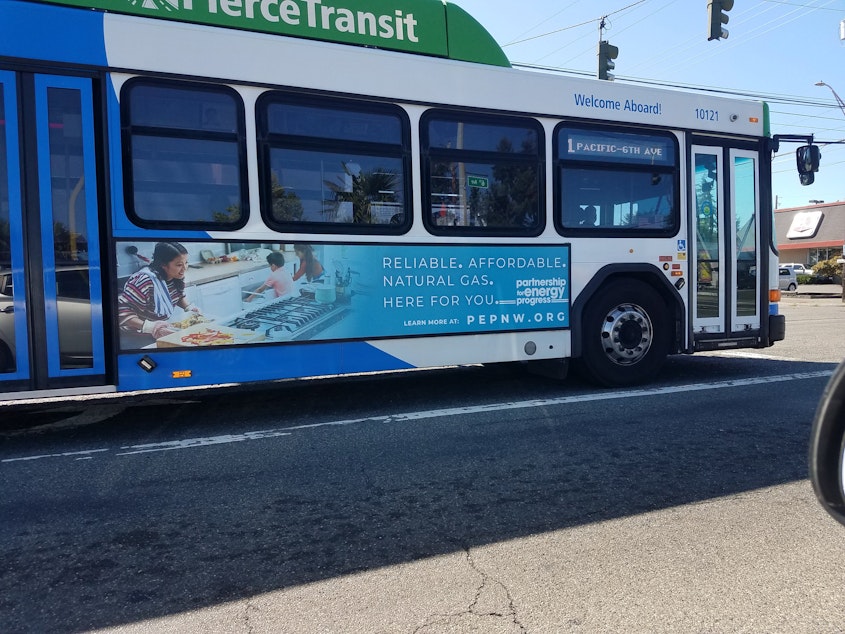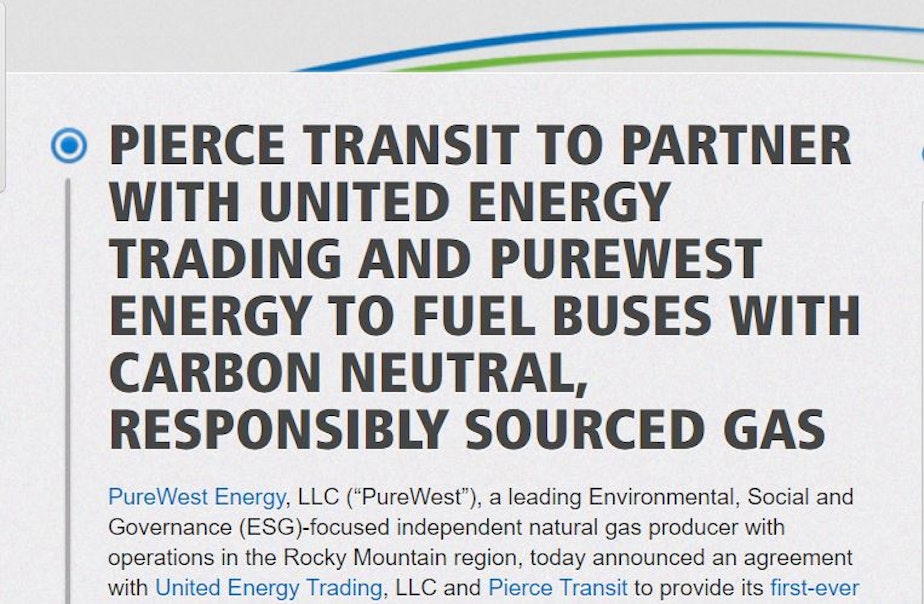New bus fuel is 'carbon neutral,' Pierce Transit claims. It's not

Tacoma-based Pierce Transit announced in November that it was switching its fleet of natural-gas buses to a different variety of the gas to help the global climate.
The agency says its buses will soon be running on what it calls “carbon-neutral, responsibly sourced” fuel from Wyoming’s biggest producer of natural gas.
While natural-gas exhaust is less damaging than diesel exhaust, the fuel's main constituent, methane, is a climate super-pollutant. Methane can trap 30 to 90 times more heat in the atmosphere than carbon dioxide, depending how you compare the two greenhouse gases.
Pierce Transit’s gas, in other words, is far from carbon neutral.

Pierce Transit has been running buses on compressed natural gas since the 1980s as a less polluting alternative to diesel. The agency runs about 200 buses — most of its fleet — on natural gas.
Sponsored
“We have a lot invested into natural gas, with our training, the equipment, our on-site fueling station,” Pierce Transit maintenance director Adam Davis said.
“Compared to diesel, there's a lot less direct exhaust if you're right next to the bus,” said Claudia Riedener, a Tacoma climate activist and frequent pedestrian.
A tailpipe from a natural-gas engine puffs out about a third less carbon dioxide than a tailpipe from a similar engine running on diesel. But with all the methane leaked during natural-gas production, natural gas does only 6% to 11% less climate damage overall than diesel, according to Argonne National Laboratory.
“Of all the hydrocarbons, methane is the smallest one,” Riedener said. “And because it is so tiny, it can sneak out everyplace.”
Pierce Transit’s new gas supplier, PureWest Energy, says the 92 wells that supply Pierce Transit buses have been certified as leaking less climate-harming methane than 90% of the industry, making them a responsible source of the fuel.
Sponsored
PureWest says those wells leak only .04% of the methane they produce, much lower than the 2.3% national leakage rate.
The majority of the company’s 3,400 gas wells have not been certified.
“We've shortened our time to repair a leak,” Kelly Bott with PureWest said. “Once we find a leak, we're repairing that within about a day.”
The Denver-based energy company was known as Ultra Petroleum before filing for bankruptcy in 2020.
“We are natural gas producers with a sustainability focus,” Bott said.
Sponsored
“Terms like sustainable and renewable are most definitely not applicable to any fracked gas operation, any gas wells,” Riedener said.
PureWest says it offsets the climate damage from operating the certified wells by helping fund a swamp-forest preserve owned by the National Audubon Society in South Carolina.
That’s why Pierce Transit claims the fuel is carbon-neutral.
Of course, when a Pierce Transit driver starts up a bus engine, carbon dioxide still comes out the tailpipe and helps to heat up the planet.
“My goodness, that is an amazing piece of greenwash!” climate activist Dan Villa with 350 Tacoma said in an email.
Sponsored
Greenwashing is like whitewashing—a deliberate attempt to conceal unflattering or incriminating facts—but with an environmental tinge.
PureWest usually makes a narrower claim: that its activities involved in producing Pierce Transit’s fuel are carbon-neutral.
“We've offered a carbon-neutral for Scope 1 and Scope 2 emissions, responsibly sourced gas product,” Bott said.
In the lingo of carbon accounting, “Scope 1” covers a company’s direct emissions, like methane leaked from its wells. “Scope 2” covers emissions from the electricity it purchases, while “Scope 3” covers what for many companies is the biggest source of pollution: operations of suppliers and the activities of customers using its products.
“We view ‘responsibly sourced gas’ really as quite a bit of greenwashing,” said Sierra Club electricity sector analyst Cara Bottorff. “There's really no true way to responsibly source gas. It's a fossil fuel. It needs to stay in the ground just like coal and oil, and we need to be using clean energy instead.”
Sponsored
“If we can get it out of the ground as responsibly as we possibly can and do what we can to offset and sequester any additional carbon that we're generating, I think that it can be part of a long-term solution, in addition to a mix of renewables and just a reduction in overall use,” Bott said.
“It's just not conscionable anymore in the year 2021,” Riedener said of fossil-fuel use.
Climate scientists have for years urged a rapid, society-wide transition away from all fossil fuel use in order to stave off catastrophic levels of climate change.
At the same time, scientists, activists, and most recently, the Biden Administration, have called for reducing leaks of methane as low-hanging fruit to slow greenhouse gas emissions.
“Reducing leakages is great because, obviously, there is no way we can turn off all the gas immediately,” Riedener said.
On Nov. 2, the Environmental Protection Agency proposed regulating methane pollution from the oil and gas sector, with a final rule expected by the end of 2022.
Maintenance Director Adam Davis says Pierce Transit sought to lower its buses’ carbon footprints as soon as possible.
“It feels like a short-term opportunity that we took advantage of, and I wouldn't want to lock myself into any long-term decision,” Davis said. “I just did a contract through 2022 to give me more time to continue to expand our electrification of our buses.”
Davis said Pierce Transit is paying about a 25% premium for the gas from PureWest.
“We saw it as a good first step as we transition to newer technologies and see how we can continue to move the needle in reducing our carbon footprint,” Davis said.
Is Pierce Transit’s compressed gas less harmful to the climate than the same fuel from other sources? Project Canary, the third-party company hired by PureWest, certifies the answer as yes.
Is the gas carbon-neutral? No. Not even close.
In response to a question from KUOW, Davis acknowledged the claim is misleading.
“I didn't see it that way when we did the news release,” he said. “But I think we can work internally to clarify that.”
Is riding a Pierce Transit bus better for the planet than hopping in your own car or riding on a diesel bus? Almost certainly yes: Buses almost always use less energy per passenger than most cars on the road today.
The only way to get close to carbon-neutral travel is with a vehicle that doesn't run on fossil fuels, whether that’s an e-bike, scooter, car, bus, or train powered by clean electricity.
Of course, you could also go for carbohydrate-powered transportation and walk or bicycle to your destination.




